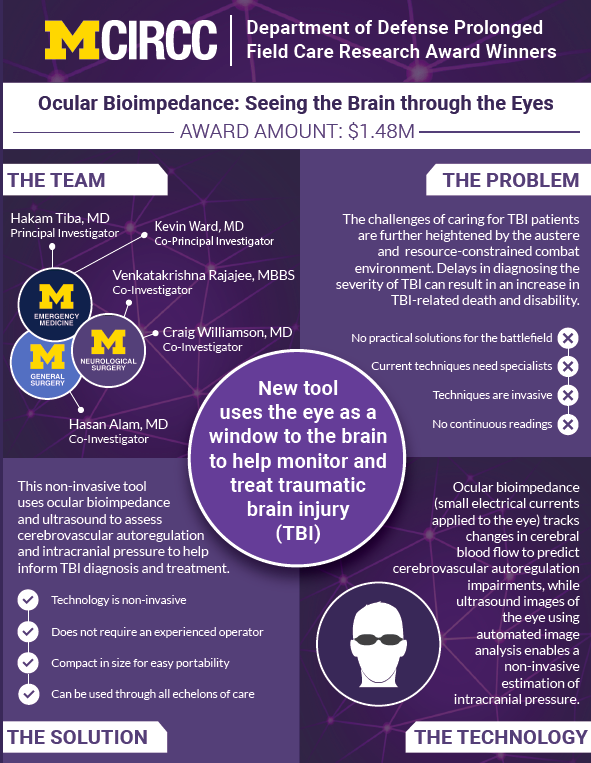MCIRCC Teams win $7.48M from Department of Defense Prolonged Field Care Grants
In June, three MCIRCC multidisciplinary research teams received Prolonged Field Care Research Awards from the Department of Defense’s Combat Casualty Care Research Program (CCCRP). These awards call for the development of next-generation diagnostics, monitoring, resuscitation, and stabilization methods for prolonged field care (PFC) and prolonged damage control resuscitation (pDCR).
Kevin Ward, MD, Hasan Alam, MD, and Hakam Tiba, MD, MS, are the principal investigators for the three winning studies. In total, the teams received a combined $7.48 million in funding.
In past years, improvements to the trauma care system focused on shortening the evacuation time from the battlefield to the ICU. However, in future conflicts or mass trauma events, the DoD anticipates that the initial evacuation time may be delayed for hours or days. The goal of this research is to address the negative effects of delayed surgical intervention, especially when resources are limited.
“Recently, the military has recognized PFC as an area of key emphasis for research, education and training with increased focus on pDCR. This effort focuses on the first 72 hours after injury or trauma in order to decrease mortality and morbidity, utilize limited resources in an austere environment, and provide effective and continued care,” said Dr. Tiba.
Dr. Tiba’s research is exploring a novel, noninvasive method of assessing intracranial pressure (ICP) and cerebrovascular autoregulation (CAR). CAR is one of the most important neuroprotective processes in the brain and is crucial to preventing secondary injury. Dr. Tiba is developing a wearable device placed on the eyelid that will be used to evaluate the cerebral blood volume (CBV) and CAR. Simultaneously, he is developing an algorithm capable of analyzing the optic nerve sheath via ultrasound, allowing responders to evaluate ICP on-site.
With these two technologies working in tandem, Dr. Tiba and his team believe they will be able to significantly accelerate the decision-making process and improve patient outcome thanks to early detection of secondary brain injury. Dr. Tiba received $1.48M in funding for his research.
Uncontrollable hemorrhage is a significant cause of preventable death on the battlefield. It is especially difficult to stop bleeding in the abdomen and pelvis, with traditional treatments such as applying direct pressure or using tourniquets often rendered useless. To help solve this problem, Dr. Kevin Ward is developing a new method of aortic occlusion using an orally placed gastroephageal device, referred to as GROA. The device allows partial to full mechanical occlusion of the aorta through the esophagus and/or stomach to stop hemorrhage.
GROA leverages the anatomical relationship between the esophagus and stomach to the thoracic and abdominal aorta. As a minimally invasive device, it can be used to rapidly stabilize the patient by controlling severe non-compressible abdominal hemorrhage at the point of impact. To develop this method fully, the DoD awarded Dr. Ward and his team $3M in funding.
Lastly, Dr. Hasan Alam received $3M in funding for his research on using valproic acid (VPA) to mitigate the adverse consequences of pDCR. There are currently no treatments available that can be used in the austere battlefield with delayed evacuation to minimize organ injury and prolong survival until patients can receive more comprehensive care.
Dr. Alam’s study looks to develop a therapeutic approach using VPA, an FDA-approved anti-seizure medicine that has been shown to reduce brain lesion size, inflammation, and swelling. VPA has also been demonstrated to improve long-term neurological recovery and healing in large animal models of TBI and hemorrhagic shock.
In the coming months, we will profile each of these teams and their innovative research in greater detail.




